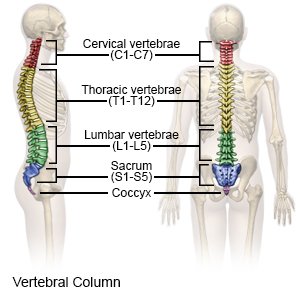Cervical Sympathectomy
Medically reviewed by Drugs.com. Last updated on Aug 4, 2025.
What do I need to know about a cervical sympathectomy?
A cervical sympathectomy is surgery to destroy or remove nerves in your neck. The surgery is mainly used to treat hyperhidrosis (heavy sweating) in the armpits or on the hands.
 |
How do I prepare for surgery?
- Your surgeon will tell you how to prepare. He or she may tell you not to eat or drink anything after midnight before surgery. Arrange to have someone drive you home when you are discharged.
- Tell your surgeon about all your current medicines. He or she will tell you if you need to stop any medicine for surgery, and when to stop. He or she will tell you which medicines to take or not take on the day of surgery.
- Tell your surgeon about any allergies you have, including to anesthesia.
- You may need to have blood tests before your surgery. A cervical spine x-ray, CT scan, or MRI may be done to look at your neck and spinal cord before your surgery. Contrast liquid may be used to help these show up better in pictures. Tell the healthcare provider if you have ever had an allergic reaction to contrast liquid. You also may need tests to check the function of the nerves in your arms.
Related medications
What will happen during surgery?
- You will be given general anesthesia to keep you asleep and free from pain during surgery. Your surgeon will make 2 or 3 incisions in your chest, just below your armpit. He or she will collapse your lung. This helps your surgeon see the area better so he or she can find the correct nerves.
- Your surgeon may use chemicals to destroy the nerves. The nerves may instead be cut or removed.
- Your lung will be inflated. The incision will be closed and covered with a bandage to prevent an infection.
What should I expect after surgery?
- You may be given medicine to prevent or treat pain or a bacterial infection.
- You will be helped to walk around to prevent blood clots.
- You may have more sweating than usual on your abdomen, back, or legs. This is called compensatory sweating, and it is normal because of the loss of sweating under your arms or on your hands. Compensatory sweating is permanent.
What are the risks of a cervical sympathectomy?
You may bleed more than expected or develop an infection. Your hands may be very dry. You may have eyelid drooping on the surgery side. This is usually temporary. Your nerves, spinal cord, blood vessels, or other tissues may be damaged during surgery. Your lung may not inflate after surgery. A chest drain (tube) may be needed if this happens. You may develop a pleural adhesion (bands of fiber in an area of your lung). This may cause pain when you breathe or cough. Compensatory sweating is sometimes severe. You may need more surgery for severe sweating. The surgery is more successful for hand sweating. You may need more surgery if you had surgery for armpit sweating.
Care Agreement
You have the right to help plan your care. Learn about your health condition and how it may be treated. Discuss treatment options with your healthcare providers to decide what care you want to receive. You always have the right to refuse treatment. The above information is an educational aid only. It is not intended as medical advice for individual conditions or treatments. Talk to your doctor, nurse or pharmacist before following any medical regimen to see if it is safe and effective for you.© Copyright Merative 2025 Information is for End User's use only and may not be sold, redistributed or otherwise used for commercial purposes.
Further information
Always consult your healthcare provider to ensure the information displayed on this page applies to your personal circumstances.
